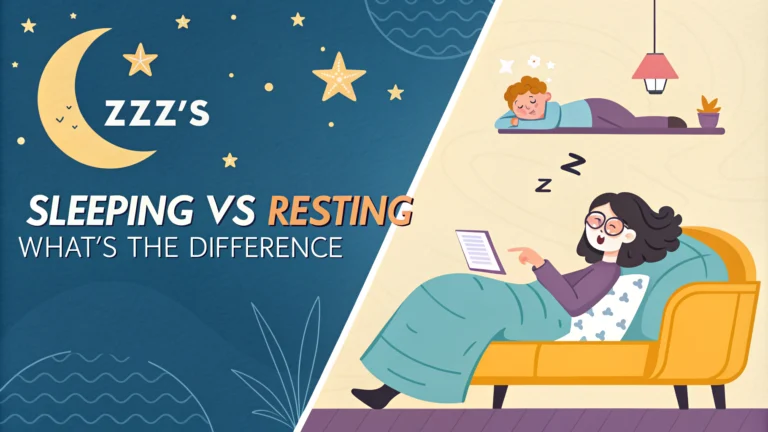Many people use the terms sleeping and resting interchangeably, but they represent distinct biological processes. **Sleep** involves a complete state of unconsciousness with distinct brain wave patterns, while **rest** refers to a wakeful state of physical and mental relaxation.
Your body goes through different recovery processes during sleep versus rest. During sleep, your brain processes memories and repairs neural pathways, while rest primarily helps reduce physical tension and mental fatigue.
The Science Behind Sleep
**Sleep cycles** follow a specific pattern through different stages – from light sleep to deep sleep and REM. Each stage serves unique functions:
- Brain wave activity changes throughout cycles
- Hormones like melatonin regulate sleep patterns
- Body temperature drops during sleep
- Muscle activity decreases significantly
Benefits of Conscious Rest
**Mindful rest** offers distinct advantages that complement sleep:
- Reduced muscle tension
- Lower stress levels
- Improved mental clarity
- Better emotional regulation
“Rest is not idleness – it’s a form of physical and mental restoration that doesn’t require sleep.” – Dr. Matthew Walker, Sleep Scientist
When to Sleep vs When to Rest
Understanding the right time for each activity improves overall well-being:
| Signs You Need Sleep | Signs You Need Rest |
|---|---|
| Heavy eyelids | Mental fatigue |
| Difficulty concentrating | Physical tension |
| Yawning frequently | Feeling overwhelmed |
Types of Restful Activities
Different rest activities serve unique purposes for mental and physical recovery:
**Active Rest**:
- Light stretching or gentle yoga
- Slow walking in nature
- Deep breathing exercises
**Passive Rest**:
- Reading a book
- Listening to calming music
- Practicing meditation
Creating an Effective Rest Routine
A structured approach to rest improves its effectiveness:
| Time of Day | Recommended Activity |
|---|---|
| Morning | 5-minute meditation |
| Afternoon | 10-minute walk |
| Evening | 15-minute reading |
**Schedule breaks** between tasks to prevent mental fatigue. Set reminders to take regular rest intervals.
Common Misconceptions About Rest
Understanding the truth about rest helps maximize its benefits:
- Rest is not laziness – it’s essential for productivity
- Scrolling social media isn’t restful
- Short breaks are as valuable as longer ones
- Rest can be active, not just lying down
“Strategic rest enhances performance more effectively than continuous work.” – Alex Soojung-Kim Pang, Author of “Rest”
Implementing Better Recovery Habits
Small changes create significant improvements in rest quality:
**Daily Practice**:
- Set boundaries around work hours
- Create a dedicated rest space
- Practice mindful breathing between tasks
- Track energy levels to identify optimal rest times
**Environmental Adjustments**:
- Reduce screen brightness
- Maintain comfortable room temperature
- Use noise-canceling headphones when needed
Remember to monitor your body’s signals and adjust rest patterns accordingly. Quality rest supports better sleep and enhances overall well-being.
FAQs About Sleeping vs. Resting
Q: What’s the main difference between sleeping and resting?
Sleeping involves a complete loss of consciousness and consists of specific brain wave patterns and sleep cycles. Resting is a wakeful state where you’re physically inactive but fully conscious.
Q: Does lying in bed count as sleep?
No. Simply lying in bed with your eyes closed is rest, not sleep. Sleep requires specific biological processes including reduced heart rate, decreased body temperature, and altered brain activity patterns.
Q: How many calories do you burn while sleeping vs resting?
An average person burns:
- Sleeping: 40-50 calories per hour
- Resting: 60-70 calories per hour
Q: Can resting replace sleep for recovery?
No. While resting provides physical recovery, it cannot replace sleep’s crucial functions:
- Memory consolidation
- Cell repair
- Hormone regulation
- Immune system maintenance
Q: Why do I feel tired after resting but not sleeping?
Rest doesn’t initiate the same restorative processes as sleep. Without proper sleep cycles and REM sleep, you won’t experience the full benefits of recovery.
Q: Is a power nap considered sleeping or resting?
A power nap (10-20 minutes) is considered light sleep, entering only the first stage of the sleep cycle. Anything shorter is typically just rest.
Q: What happens to brain waves during sleep vs rest?
| State | Brain Wave Type |
|---|---|
| Rest | Alpha waves (8-13 Hz) |
| Sleep | Theta and Delta waves (4-8 Hz and 0.5-4 Hz) |
Q: Does meditation count as sleep or rest?
Meditation is a form of active rest. While it can be deeply relaxing and beneficial, it’s physiologically different from sleep.
Q: How long should I rest vs sleep daily?
Adults need:
- Sleep: 7-9 hours per night
- Rest: 2-3 short periods (15-30 minutes) throughout the day
Q: Can sleeping too much be worse than resting?
Yes. Oversleeping (more than 9 hours regularly) can lead to health issues, while additional rest periods are generally not harmful.



















